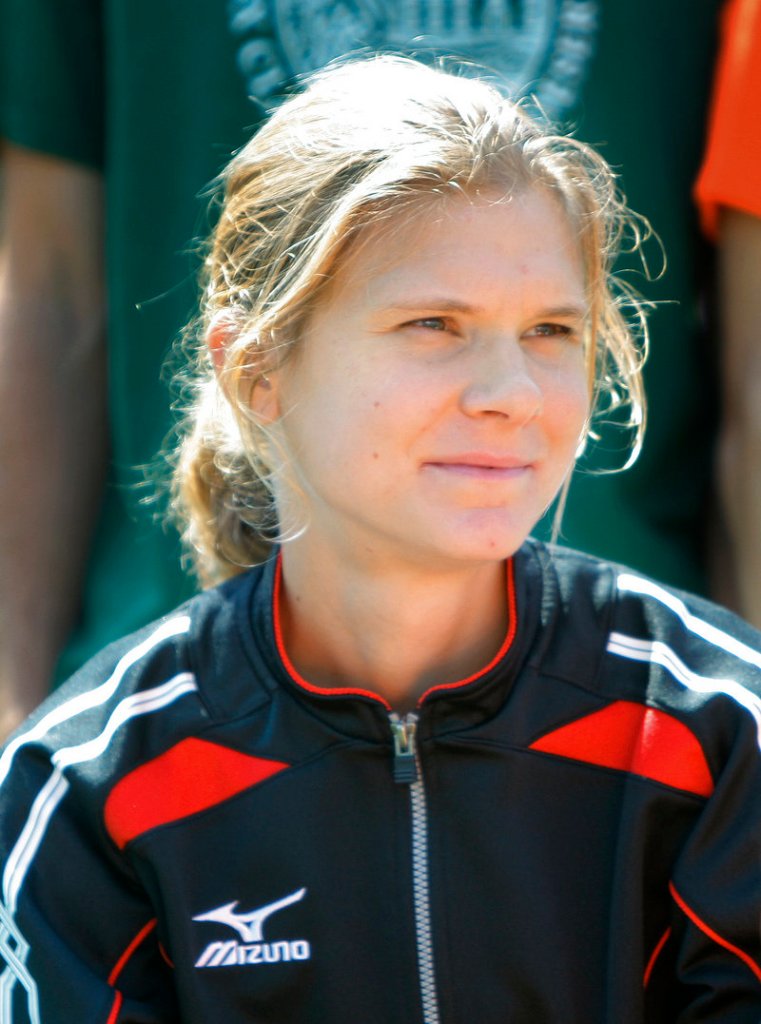CAPE ELIZABETH – One minute, Lindsay Scherf was running to the front, keeping contact with the Kenyans. The day was hot and getting hotter and she was fast, hoping to be faster.
The next minute she was barely running at all.
“Achilles,” said Scherf, referring to the tendon in one leg. “Sometimes what you think has mended hasn’t.”
Scherf is an elite American female road racer. She has speed and endurance. She’s 25 years old, a Harvard graduate from Scarsdale, N.Y., and some in the very insular world of distance running believe she could be great.
Scherf finished Saturday’s TD Beach to Beacon 10K in 4,744th place with a time of 1 hour, 6 minutes, 53 seconds. Margarat Wangari-Muriuki of Kenya needed 31 minutes, 52 seconds to win. So many runners passed Scherf and must have noted her bib number of 119, the mark of an elite.
“I pretty much walked to the finish.”
The light and animation in her eyes that was visible at the race press conference the day before had disappeared. “It’s hard to not think you’re only as good as your last race. I’ll get through this. Running is still fun.”
For 15 years, Beach to Beacon race storylines have been about triumph and perseverance. Thousands of personal celebrations, large and small. Scherf should have been one of those celebrations. Her road has had more than its share of potholes that might have sent her off in another direction.
As a Harvard sophomore she set the American junior (under age 20) record in the 10K. Five years later cancer killed her father. He had been her compass in many ways.
That’s why she felt a rush of emotions at Friday’s press conference. The Center for Grieving Children in Portland was the designated beneficiary of this year’s race. Scherf didn’t know this until she heard Anne Lynch, the center’s executive director, speak.
“I have an older sister (and) my mom. It really is a small family,” said Scherf. “I have good friends. It was a process. I had a lot of grief but eventually it was like coming out of a tunnel.”
She quit running. “I was going to the Air Force Officer Training School. I wanted to fly planes. I took the exam for flight school when they told me I couldn’t fly. At the 11th hour it was a no-go.”
Scherf has exercise-induced asthma. The Air Force, she said, had concerns. Never mind that her asthma hadn’t slowed her competitive running career, although it did derail her for a year. While a Harvard student, she refused a drug test after finishing second in the Gold Coast Marathon in Australia. She believed her asthma medication would cause a positive result and told the race organizers.
The International Association of Athletics Federation suspended her for a year, half the normal two-year suspension. It did not believe she had intentionally done anything wrong, but the punishment disturbed her and her family.
She has a form of dyslexia, a learning disability. She struggled to read. “I thought I was stupid. That’s why I loved to run. I was able to prove I could do something well.” She graduated from Harvard with a degree in psychology.
During her father’s illness, pain from bones piercing tendons in both feet became more pronounced. “It was like I was running with a rock in my shoe. I needed surgery but I put it off. I didn’t want to be on crutches while my father was in the hospital.”
She also didn’t have health insurance. A doctor who was part of her running circle performed the surgery, donating his time. She paid for the anesthesia.
She seems so tough and so vulnerable at the same time. This spring she finished 11th in a 10K race in Albany, N.Y. Disappointed, she drove an hour or so south with her coach the next day to race in another 10K in Middletown, N.Y. She won, becoming the first American-born winner of the Orange Classic in 23 years.
Scherf wasn’t born when Joan Samuelson ran through the tunnel in the Los Angeles Coliseum and into the sunlight to win the first Olympic marathon for women in 1984. But she knows Joan’s story well.
“Joanie is the pinnacle of a role model. She’s absolutely relevant to all of us today. She was so tenacious. She always persevered.
“In this sport you can easily dive into self-pity,” Scherf said Friday. “I won’t do that.”
Staff Writer Steve Solloway can be contacted at 791-6412 or at:
ssolloway@pressherald.com
Twitter: SteveSolloway
Copy the Story Link
Send questions/comments to the editors.



Success. Please wait for the page to reload. If the page does not reload within 5 seconds, please refresh the page.
Enter your email and password to access comments.
Hi, to comment on stories you must . This profile is in addition to your subscription and website login.
Already have a commenting profile? .
Invalid username/password.
Please check your email to confirm and complete your registration.
Only subscribers are eligible to post comments. Please subscribe or login first for digital access. Here’s why.
Use the form below to reset your password. When you've submitted your account email, we will send an email with a reset code.